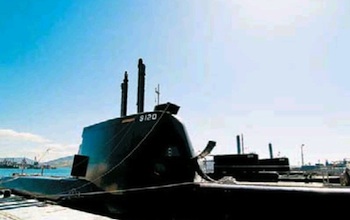Photo: ethnos.gr
A tax inspection of submarines type 214, new submarines type "Papanikolis" and of the contracts for the old submarines type 209 which were built in the 1970s carried out by the German justice has detected amounts which are recognized as "commissions". In particular, after inspecting "Atlas" company, the tax office in northern Bremen has found out that the amount of 2 million euro had been paid to the representation of the firm in Greece against which it has launched legal proceedings. The accusations of illegal payments which the company had brought against the representation did not interest the prosecutor’s office in Bremen in 2010 but a recent tax inspection has brought tax officials and prosecutors to the offices of "Atlas" and the company "Rhine Metal Electronic Defence Systems" which used the same representation in Greece. The prosecutor’s office in Bremen is interested in e-mails, contracts with offshore companies and other documents showing that, from 1 June 2002 to 2007 at least, each of the companies, namely "Atlas" and "Rhine Metal", had paid 8,520,000 euro for the modernization of three "Poseidon" submarines and of their electronic equipment. The two German companies had used a company in Panama, two firms in London and one in Athens for those payments, knowing that the award of the contracts would largely depend on these payments.
15% commission

The commissions to the firm in London for the Greek representative of "Atlas" reached 15% of the volume of the order, which is an extremely high rate despite the fact that it was a "post office box firm", i.e. a firm with no experience in the modernization of submarines. At least one employee of the Greek company that was collaborating with "Atlas" has testified before the law firm which was in charge of the internal control of the company that the representative had paid "considerable" amounts which the prosecutor’s office in Bremen interprets as commission.
A source from the prosecutor’s office in Bremen notes that the case of the modernization of the submarines type 209 with electronic systems is reminiscent of the "Ferostaal" case in which, during the signing of a contract for the construction of submarines type 214, "Ferostaal" had transferred 11 million euro to a company in the British Virgin Islands which belonged to its Greek collaborator. Both the representatives of "Atlas" and "Ferostaal" had threatened to turn to justice. In 2005 "Atlas" was transferred to the company "ThyssenKrupp" which controlled Skaramanga shipyards as well as the shipyard in Kil, which had built the submarines type 214. The supervisory board of "Thyssen" was presided by Gerhard Krome who worked at Siemens at the same time. So, when "Thyssen" revealed the agreement between Greece and its "Ferostaal" associate in March 2010 it launched an internal investigation in "Atlas".
At the same time, the payments to the amount of 18 million euro for the submarines type 209 had begun immediately after the signing of the contract in June 2002. The prosecutor's office in Munich has detected payments of another 3 million euro made by two companies from the Virgin Islands, which were owned by Greek businessmen. The last payment for the submarines type 209 to the amount of 30 million euro (the total amount paid is 321 million euro) was made in late 2006. The Greek state had received the "Okeanos" submarine. Evangelos Venizelos, being Minister of Defence at the time, had cancelled the obtaining of the other two modernized submarines and ordered two new submarines type 214 instead. However, this agreement has not been implemented either.